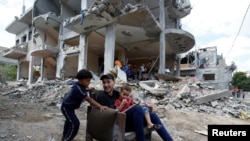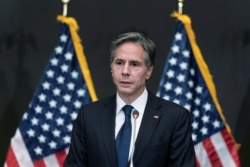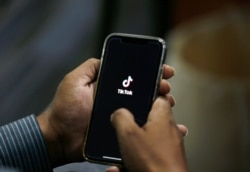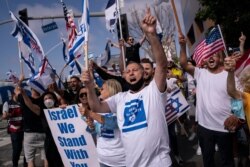Student Union
Palestinian Students Recount Feelings of ‘Survivor’s Guilt’

Young Palestinians living and studying abroad say they are tied to social media with a sense of helplessness as they follow the repercussions from the most recent violence back home.
“You kind of get, like, survivor's guilt. You know, like, ‘Why is it not me that that's happening to?’ and ‘What, like, what can I do to help these people?’ ” described Mona Salah, a law student at Bristol University in the United Kingdom.
Protests broke out in early May after the Israeli Supreme Court sanctioned the eviction of Palestinian families from Sheik Jarrah, a historically Palestinian neighborhood in East Jerusalem.
Settler groups contend that Jews owned the land before the creation of Israel in 1948. The Office of the U.N. High Commissioner for Human Rights says Sheik Jarrah is on occupied Palestinian territory, making the ruling a violation of international law.
Hamas launched rocket attacks into Israel following subsequent clashes between Palestinians and Israel police outside Al Aqsa mosque in Jerusalem, prompting a strong defensive response by Israeli Defense Forces. The worst fighting in the region since 2014 left 248 people dead in Gaza and 13 in Israel.
U.S. Secretary of State Antony Blinken made the rounds Wednesday in neighboring Jordan — heavily populated by Palestinians whose families came as refugees before 1967 — to buttress a cease-fire brokered last week by the U.S. and Egypt.
University students and young Palestinians from Gaza and the West Bank say the latest exchange of hostilities has made already bad conditions worse.
“You know, when you're in survival mode, you're not really so worried about your education, you're worried about living, you're worried about what your next meal is going to be,” said Jude Elrayes, a student at Ryerson University in Canada. During the 11 days of fighting, she said, she checked in with her family in Gaza often, to make sure they got through the day.
“These messages are not easy to read, especially knowing that that could have easily been you. You know, that could have easily been me back there. But I was so lucky and blessed enough to be here, which is something that brings on a lot of survivor's guilt,” Elrayes continued.
Travel blocked
Israeli and Egyptian blockades have prevented thousands of students from leaving Gaza to pursue a higher education — even when they have visas from host countries and support from educational institutions abroad, according to the website Gaza Unlocked, run by the American Friends Service Committee (AFSC), as well as other human rights organizations.
Economic hardship leading to an inability to pay tuition fees led to a 70% dropout rate for students in graduate programs in the Gaza Strip in 2019, based on a 2020 study by Al-Mezan Center for Human Rights in Gaza.
Palestinian students who live outside the West Bank and Gaza Strip said they feel fortunate to have passports that permit them to study abroad, often acquired through parents who have long lived abroad. Most Palestinians do not have official passports recognized by other governments.
“I'm lucky to have a Swedish passport, because my dad lived there for like 20 years or something. So we were granted nationality,” Salah said. “And so under that basis, I would be allowed to enter [Israel]. But if I solely had my Jordanian passport, I wouldn't be allowed to enter, especially with the security checks they do.”
Salah said her mother, born in Nazareth, has been stuck at checkpoints and border crossings for up to 18 hours when returning to the West Bank from Amman, Jordan, where they live now.
Glued to social media
Many Palestinians report being tethered to social media to connect with the Palestinian territories and share information with non-Palestinian students.
“That's why so many of us are glued to our phones right now, as Palestinians, because we're trying to do the best that we can,” Elrayes said, reporting that her screen time on Instagram has averaged close to eight hours a day recently.
Elrayes created a video that amassed more than 30,000 views between Instagram and Tik Tok sharing information on the most recent fighting.
Celebrity voices lending support and solidarity are welcomed, they said. Model Bella Hadid shared images of her grandparents’ wedding in Nazareth and of a Los Angeles rally for the Palestinians.
“Palestine’s never had this much attention in Western media and that’s largely due to social media. Western media favors the state’s narrative, and all Palestinians have are our cameras,” said Aya Ghanameh, a student at the Rhode Island School of Design.
However, speaking out may come with costs.
Hadid deleted her pro-Palestinian posts and actor Mark Ruffalo deleted a post that called the occupation a “genocide,” after much blowback.
“I think it is really, really difficult to be pro-Palestine with an audience. Because a lot of people conflate the idea of like, you know, Israel with purely Judaism, and just the establishment of a Jewish state. And they fail to see that being pro-Palestine is not being against that. It's being against that at the expense of our people,” Salah said.
Palestinians studying abroad have turned to the Boycott, Divestment and Sanctions movement (BDS), as well, a Palestinian-led movement promoting boycotts, divestments and economic sanctions against Israel.
Salah said she believes the boycott can be overwhelming because “Israeli products have infiltrated our lives so much to the point where you literally have to boycott everything to boycott successfully.”
Some Jewish students in the U.S. see the boycott as reverse discrimination.
"We oppose the Boycott, Divest and Sanction movement and its efforts to isolate and demonize the only Jewish democratic state in the world," said Nathan Edelman, as a senator with the Illinois Student Government in September 2020.
"Past BDS referendums and resolutions have only increased hate, hostility and mistrust on our campus."
Western universities not always responsive
Palestinians studying outside the West Bank and Gaza said they found it difficult to connect with others about their identity, and their universities' responses to recent events have been sparse.
“Everyone kind of has this experience that the university sends out an email about a current political issue and has mental health awareness and stuff like that, and you know, who to reach out to, if you're troubled by what's going on and stuff like that.” Salah shared.
“But suddenly, because this is such a, you know, controversial topic, we didn't get any of the, for the Palestinian cause, which is really concerning,” she said.
Students said it can be challenging to find people they can share their heritage with.
“I'm very proud to be Palestinian. But it's very sad that up until, you know, about a year ago, I wasn't comfortable just being like, ‘Oh, I'm Palestinian,’ because a lot of people prior to these two weeks, didn't even know what Palestine was,” Elrayes explained.
See all News Updates of the Day
- By VOA News
Competition grows for international students eyeing Yale

It’s tough to gain admission to Yale University, and it’s getting even tougher for international students as standout students from around the world set their sights on Yale.
The Yale Dale News, the campus newspaper, takes a look at the situation here.
- By VOA News
Student from Ethiopia says Whitman College culture made it easy to settle in

Ruth Chane, a computer science major from Ethiopia, writes about her experiences settling into student life at Whitman College in the U.S. state of Washington.
"The community at Whitman College made sure I felt welcomed even before I stepped foot on campus," she says.
- By VOA News
Claremont Colleges student gets a shock when she heads home to Shanghai

In The Student Life, the student newspaper for the Claremont Colleges, a consortium of five liberal art colleges and two graduate schools in Claremont, California, student Rochelle Lu writes about readjusting to her Shanghai home after spending a semester in the United States.
- By VOA News
Cedarville University aims to ease transition for international students

Cedarville University in the U.S. state of Ohio says it’s got more than 140 international students representing 44 countries.
Here, the school interviews Jonathan Sutton, director of international student services. He talks about his job and the opportunities for international students on campus.
- By VOA News
Morehouse College offers prospective students tips on applying and thriving

Morehouse College, a private, historically Black liberal arts college in the U.S. state of Georgia, offers a guide for international students interested in attending the school.
Among the tips to apply and thrive at Morehouse:
- Take advantage of the school’s orientation program
- Turn to the school’s Center for Academic Success for tutoring, support and more
- Immerse yourself in campus life via clubs and societies
- By Reuters
US reviews Columbia University contracts, grants over antisemitism allegations

The administration of President Donald Trump said on Monday it will review Columbia University's federal contracts and grants over allegations of antisemitism, which it says the educational institution has shown inaction in tackling.
Rights advocates note rising antisemitism, Islamophobia and anti-Arab bias since U.S. ally Israel's devastating military assault on Gaza began after Palestinian Hamas militants' deadly October 2023 attack.
The Justice Department said a month ago it formed a task force to fight antisemitism. The U.S. Departments of Health and Education and the General Services Administration jointly made the review announcement on Monday.
"The Federal Government's Task Force to Combat Anti-Semitism is considering Stop Work Orders for $51.4 million in contracts between Columbia University and the Federal Government," the joint statement said.
The agencies said no contracting actions had been taken yet.
"The task force will also conduct a comprehensive review of the more than $5 billion in federal grant commitments to Columbia University."
The agencies did not respond to requests for comment on whether there were similar reviews over allegations of Islamophobia and anti-Arab bias.
Columbia had no immediate comment. It previously said it made efforts to tackle antisemitism.
College protests
Trump has signed an executive order to combat antisemitism and pledged to deport non-citizen college students and others who took part in pro-Palestinian protests.
Columbia was at the center of college protests in which demonstrators demanded an end to U.S. support for Israel due to the humanitarian crisis caused by Israel's assault on Gaza. There were allegations of antisemitism and Islamophobia in protests and counter-protests.
During last summer's demonstrations around the country, classes were canceled, some university administrators resigned and student protesters were suspended and arrested.
While the intensity of protests has decreased in recent months, there were some demonstrations last week in New York after the expulsion of two students at Columbia University-affiliated Barnard College and after New York Governor Kathy Hochul ordered the removal of a Palestinian studies job listing at Hunter College.
A third student at Barnard College has since been expelled, this one related to the occupation of the Hamilton Hall building at Columbia last year.
Canada’s immigration overhaul signals global shift in student migration
From Europe to North America, nations are tightening their immigration policies. Now Canada, long seen as one of the world's most welcoming nations, has introduced sweeping changes affecting international students. The reforms highlight a growing global trend toward more restrictive immigration policies. Arzouma Kompaore reports from Calgary.
Trump administration opens antisemitism inquiries at 5 colleges, including Columbia and Berkeley

The Trump administration is opening new investigations into allegations of antisemitism at five U.S. universities including Columbia and the University of California, Berkeley, the Education Department announced Monday.
It's part of President Donald Trump's promise to take a tougher stance against campus antisemitism and deal out harsher penalties than the Biden administration, which settled a flurry of cases with universities in its final weeks. It comes the same day the Justice Department announced a new task force to root out antisemitism on college campuses.
In an order signed last week, Trump called for aggressive action to fight anti-Jewish bias on campuses, including the deportation of foreign students who have participated in pro-Palestinian protests.
Along with Columbia and Berkeley, the department is now investigating the University of Minnesota, Northwestern University and Portland State University. The cases were opened using the department's power to launch its own civil rights reviews, unlike the majority of investigations, which stem from complaints.
Messages seeking comment were left with all five universities.
A statement from the Education Department criticized colleges for tolerating antisemitism after Hamas' Oct. 7, 2023, attack on Israel and a wave of pro-Palestinian protests that followed. It also criticized the Biden administration for negotiating "toothless" resolutions that failed to hold schools accountable.
"Today, the Department is putting universities, colleges, and K-12 schools on notice: this administration will not tolerate continued institutional indifference to the wellbeing of Jewish students on American campuses," said Craig Trainor, the agency's acting assistant secretary for civil rights.
The department didn't provide details about the inquiries or how it decided which schools are being targeted. Presidents of Columbia and Northwestern were among those called to testify on Capitol Hill last year as Republicans sought accountability for allegations of antisemitism. The hearings contributed to the resignation of multiple university presidents, including Columbia's Minouche Shafik.
An October report from House Republicans accused Columbia of failing to punish pro-Palestinian students who took over a campus building, and it called Northwestern's negotiations with student protesters a "stunning capitulation."
House Republicans applauded the new investigations. Representative Tim Walberg, chair of the Education and Workforce Committee, said he was "glad that we finally have an administration who is taking action to protect Jewish students."
Trump's order also calls for a full review of antisemitism complaints filed with the Education Department since Oct. 7, 2023, including pending and resolved cases from the Biden administration. It encourages the Justice Department to take action to enforce civil rights laws.
Last week's order drew backlash from civil rights groups who said it violated First Amendment rights that protect political speech.
The new task force announced Monday includes the Justice and Education departments along with Health and Human Services.
"The Department takes seriously our responsibility to eradicate this hatred wherever it is found," said Leo Terrell, assistant attorney general for civil rights. "The Task Force to Combat Anti-Semitism is the first step in giving life to President Trump's renewed commitment to ending anti-Semitism in our schools."
- By VOA News
STEM, business top subjects for international students

The Times of India breaks down the most popular subjects for international students to study in the U.S.
STEM and business lead the pack. Read the full story here. (January 2025)
- By VOA News
Safety and visa difficulties among misconceptions about US colleges

U.S. News & World report addresses some of the misconceptions about U.S. colleges and universities, including the difficulty of getting a visa.
Read the full story here. (January 2025)
- By VOA News
Work opportunities help draw international students to US schools

US News & World Report details the three top factors in foreign students' decision to study in the U.S. They include research opportunities and the reputation of U.S. degrees. Read the full story here. (December 2024)
- By VOA News
British student talks about her culture shock in Ohio

A British student who did a year abroad at Bowling Green State University in Ohio talks about adjusting to life in America in a TikTok video, Newsweek magazine reports.
Among the biggest surprises? Portion sizes, jaywalking laws and dorm room beds.
Read the full story here. (December 2024)
- By VOA News
Harvard's Chan School tells international students what to expect

Harvard's T.H. Chan School of Public Health reaches out to international students by detailing the international student experience at the school.
Learn more about housing, life in Boston and more here.
- By Reuters
China unveils plan to build 'strong education nation' by 2035

China issued its first national action plan to build a "strong education nation" by 2035, which it said would help coordinate its education development, improve efficiencies in innovation and build a "strong country."
The plan, issued Sunday by the Communist Party's central committee and the State Council, aims to establish a "high quality education system" with accessibility and quality "among the best in the world."
The announcement was made after data on Friday showed China's population fell for a third consecutive year in 2024, with the number of deaths outpacing a slight increase in births, and experts cautioning that the downturn will worsen in the coming years.
High childcare and education costs have been a key factor for many young Chinese opting out of having children, at a time when many face uncertainty over their job prospects amid sluggish economic growth.
"By 2035, an education power will be built," the official Xinhua news agency said, adding that China would explore gradually expanding the scope of free education, increase "high-quality" undergraduate enrolment, expand postgraduate education, and raise the proportion of doctoral students.
The plan aims to promote "healthy growth and all-round development of students," making sure primary and secondary school students have at least two hours of physical activity daily, to effectively control the myopia, or nearsightedness, and obesity rates.
"Popularizing" mental health education and establishing a national student mental health monitoring and early warning system would also be implemented, it said.
It also aims to narrow the gap between urban and rural areas to improve the operating conditions of small-scale rural schools and improve the care system for children with disabilities and those belonging to agricultural migrant populations.
The plan also aims to steadily increase the supply of kindergarten places and the accessibility of preschool education.
- By VOA News
A look at financial aid options for international graduate students in US

The Open Notebook, a site focusing on educating journalists who cover science, has complied a list of U.S. graduate program financial aid information for international students.








